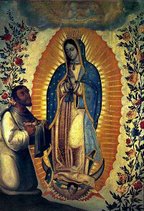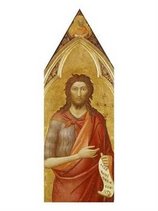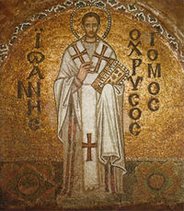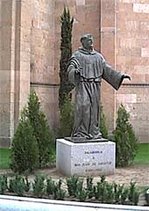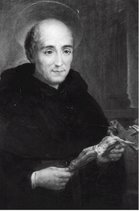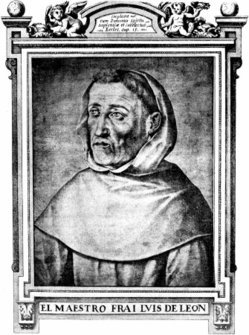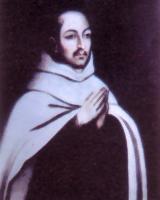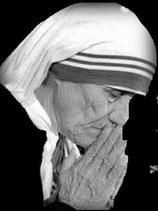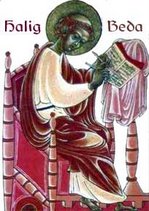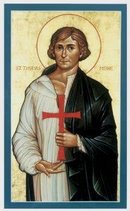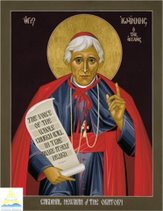499
The militia men shoved him out of his house, ready to make him the 499th martyr for some future beatification. Don Bartolomé let himself be pushed along knowing that he had few hopes. Just the same as always. When he discovered that the leader of the so-called Death Squadron was Manolito from las Tejas he thought maybe all was not lost. He had been Manolito’s teacher in the town’s school and he well knew that the boy’s brute force was matched only by his pride.
“Manolito . . . .” he yelled.
“Name’s Blood, don Bartolomé and I’m not don Manuel either because dons aren't worth a damn any more.”
“Well Don Blood you wouldn’t be planning to kill me, the priest, and the nuns of the Incarnation just like that without convincing us that we’re dying for Freedom and the Revolution?”
“I was thinking ‘don’t put off to tomorrow what you can do today’ like you taught us. The boys are really set on taking you out. The pharmacist and the mayor slipped past us, the damn bastards!”
“But, Manolo, hombre, remember that you are a bunch of (he paused looking around him as if he were lecturing in class) rational animals and you can’t just kill us like that. You have to get the victims to agree with you so that we can happily go on ‘a little walk’ and thank you for your revolutionary work.”
“I am sure I could convince you but not the priest who is so closed minded. Or the nuns who don’t even look at me in the face.”
“Then it’s a deal, Blood, if you convince me you can kill the lot of us,” and he held out his hand.
After that first night in July, Manolo (a.k.a Blood) and don Bartolomé the school teacher discussed political philosophy before the impatient the militia men’s shotguns and the hypersensitive ears of the local cleric. Blood started off like an convincing polemicist despite some and stops and starts. He began to persuade the astonished teacher to the nuns’ chagrin, who dizzyingly followed the twists and turns of the discussion between avemarias.
Don Bartolomé sighed. “Wow, Manolito, collectivization? It had never really dawned on me before.”
And Blood’s chest swelled, it swelled with pride.
Yet just before dawn when the cock crowed Don Bartolomé added, “Why, yes for collectivization we’d be prepared to be executed but all the same, come on! The thing is . . . the Russian Revolution just doesn’t do it for me. It leaves me cold, Blood, that’s all.”
“I have to do more research, Don Bartolomé, so you won’t slip me up by surprise. Also I’m tired. Tomorrow night I’ll convince you in a wink about the greatness of Don José Estalín. Don’t you worry.”
Every night Blood savored the sweet honey of intellectual victory. So much so that he didn’t want any advantage over his opponent. So he allowed the school teacher to return home so he could be near his books for the latest point to be made. The nuns with there hushed speech, distracted them from the debate, and so they returned to the cloister.
And the priest who was for completely closed-off and wouldn’t be persuaded a bit was the only one to stay in the makeshift dungeon they’d set up in the church. The militia men divided into two: those who found pleasure in the nocturnal get togethers and the bohemian lifestyles of intellectuals. And those who got bored and went back to their former agrarian tasks with relief.
A thousand and one nights had not passed but less than half that number when a detachment of the Guardia Civil entered the town. Yet it appeared that in this place they had left War behind. For Blood was dozing off in a wicker chair with Paul Leforgue’s The Right to Laziness between his legs while Don Bartolomé wandered off near the river meditating on collectivization. The guards took down two or three tattered reg flags and opened their mouths wide upon hearing that the Death Squadron was practically a Platonic Dialog.
Before leaving they named new authorities to be put into place. The priest proposed don Bartolomé and don Bartolomé suggested Blood . . . Manolito, I mean.
“Teacher, I think you're crossing the line a bit, hombre,” the captain of the Guardia Civil responded in turn.
Based on the Spanish original by Enrique García-Máiquez published on his blog Rayos y Truenos
499
Los milicianos lo sacaron a empujones de su casa, dispuestos a convertirle en el mártir 499 de una futura beatificación. Don Bartolomé se dejaba empujar, sabiendo que esperanzas tenía pocas. En cambio, esperanza la de siempre. Cuando descubrió que el jefe del autodenominado “Escuadrón de la Canina”, era Manolito, el de las Tejas, pensó que tal vez no estuviese todo perdido. Había sido su profesor en la escuela del pueblo y conocía bien que su fuerza bruta tenía un parangón: su orgullo.
—Manolito…. —gritó.
—Me llamó Sangre, don Bartolomé, y no me llamo don Manuel porque ya no hay dones que valgan…
—Pues don Sangre, ¿no pensarás matarnos a mí y al señor cura y a las monjitas de la Encarnación así como así, sin convencernos de que morimos por la Revolución y por la Libertad?
—Yo pensaba no dejar para mañana lo que puedas hacer hoy, como usted nos enseñó. Los muchachos, ya ve, están deseando darle al gatillo… El boticario y el alcalde se nos han escabullido, los muy maricones…
—Pero, hombre, Manolo, recuerda que sois unos animales (hizo una pausa, mirando en redondo, como si estuviera dando una clase) racionales y que no podéis matarnos sin más, que hay que conseguir que las víctimas os demos la razón, que vayamos tan contentas al paseo, que os agradezcamos de corazón vuestra labor revolucionaria…
—A usted seguro que le podría convencer yo, pero no al cura que es cerril al máximo, y a las monjas, qué, que ni me miran a la cara...
—Trato hecho, Sangre, si me convences a mí, nos das matarile a todos.
Y le tendió la mano.
A partir de aquella noche de julio, en el pueblo, Manolito, alias el Sangre, y don Bartolomé, el maestro-escuela, discutían de filosofía política ante las impacientes escopetas de caza de los milicianos y los hiperestésicos oídos del clero local. Sangre se destapó como un polemista eficaz, a pesar de algún que otro trabucamiento y exabrupto. Iba convenciendo al asombrado maestro, ante el pavor de las monjitas, que entre avemaría y avemaría seguían mareadas los meandros de la discusión. Suspiraba don Bartolomé:
—¡Anda, Manolito!, pues en eso de la colectivización no había yo caído…
Y a Sangre se le esponjaba el pecho. Sólo que un poco antes del alba, cuando avisaban los gallos, don Bartolomé añadía:
—Pues sí, por la colectivización estaríamos dispuestos a ser asesinados, pero ya mismo, vamos... Lo malo es que la Revolución Rusa, no sé, me pilla un poco lejos, Sangre, me deja frío.
—Tengo que documentarme, don Bartolomé, no me va usted a coger por sorpresa… Además estoy cansado. Mañana por la noche le convenzo en un periquete de las bondades de don José Estalín, pierda cuidado.
Sangre saboreaba cada noche las mieles de una victoria intelectual. Tanto, que no quería ventajas sobre su oponente. Así que dejó que el maestro volviese a su casa: que tuviese cerca sus libros para preparar el último, siempre el último, punto pendiente. Las monjas, como con tanto cuchicheo distraían el debate, volvieron a la clausura. Y el cura, que ciertamente era cerril y no se dejaba convencer ni un ápice, fue el único que se quedó en el calabozo que habían improvisado en la iglesia. Los milicianos se dividieron en dos: los que le cogieron gusto a las tertulias nocturnas y a la bohemia de la intelectualidad y los que, aburridos, volvieron aliviados a las labores del campo.
No habían pasado mil y una noches, sino un poco menos de la mitad, cuando un destacamento de la Guardia Civil entró en el pueblo. Allí parecía que la guerra no iba con ellos. Sangre estaba dormitando en una silla de anea con el libro de Paul Laforgue, El derecho a la pereza, entre las piernas; y don Bartolomé andaba por el río, pensando en la colectivización. Los guardias arriaron dos o tres banderas rojas y raídas y abrieron la boca oyendo que el “Escuadrón de la Canina” era, prácticamente, un diálogo platónico.
Antes de irse, tenían que dejar nombradas nuevas autoridades. El cura propuso a don Bartolomé y don Bartolomé a Sangre, quiero decir, a Manolito.
— Hombre, maestro, no se pase —repuso el capitán de la Guardia Civil.
Enrique García-Máiquez enlace al cuento original








